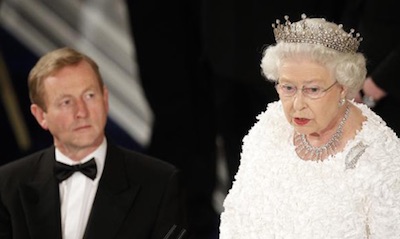
Laws stating that Queen Elizabeth is the king of Ireland and that anyone selling horses outside greater Dublin shall die are to be repealed, the Dublin government has announced.
The ancient orders and proclamations remain on the 26 County statute books and are being targeted in an clear-out of bizarre and obsolete legislation pre-dating the state’s independence.
It is the largest repeal of outdated laws carried out in any country.
Among those to be revoked is a 1542 proclamation declaring that the English crown shall be ‘king of Ireland’.
An order from 1590 prohibiting the sale of horses out of the Pale “upon pain of death” is also to be removed. The Pale was an English-ruled area on the east, roughly akin to modern-day greater Dublin, but stretched further north.
Ulster King Shane O’Neill will no longer be declared a traitor once a 1561 proclamation to that effect is repealed and Catholic proprietors will no more face removal to the western province of Connacht, as ordered in 1654.
Reform minister Brendan Howlin said the statute law revision bill 2015 will revoke 5,782 pre-independence government regulations and orders in total.
“Statute law revision is the process by which spent or obsolete legislation is removed from the statute book,” he said. “The removal leads to a more accessible statute book and will pave the way for further simplification and modernisation measures.”
DRUGS LEGALISED FOR A DAY
Although highly-paid legal experts abound in the 26 County’s public service, legal confusion is the rule, rather than the exception.
For 24 hours this week, a host of Class A drugs were legal in the state due to an accidental loophole in drug laws.
The Dublin parliament was forced to bring emergency legislation after the 1977 Misuse of Drugs Act was found unconstitutional by the Court of Appeal this morning, making the drugs it prohibits technically legal.
The bill was rushed through but comes with a provision that states it can only take effect on the day after its signature.
The ruling threw many past convictions into question.
“I’m told it’s dozens,” said Minister Leo Varadkar. “But I can’t say for certain because what they’ll have to do now is go thought each individual case and see if the people in question were charged just under this section of the act, or if they were charged with other acts as well.”
Quite separately, the Dublin government narrowly averted making heterosexual marriage illegal.
With a referendum on same-sex marriage scheduled for May, the government was forced to changed the Irish-language version of the wording of the referendum because of a possibility that a marriage between a heterosexual couple might be found unconstitutional.
Taoiseach Enda Kenny confirmed on Tuesday the Irish-language version of the amendment has been changed to bring clarity to the amendment.
The government has yet to release the amended version of the Irish translation.
The English version is: “Marriage may be contracted in accordance with law by two persons without distinction as to their sex.”
The original Irish translation was: “Feadfaidh beirt, cibe acu is fir no mna iad, conradh a dheanamh i leith posadh de reir dli.”
Directly translated back into English it stated: “A couple may, whether they are men or women, make a contract of marriage in accordance with law.”
The use of the plural created a difficulty in that one interpretation of the wording was that it distinguished only between female couples and male couples, but not between same-sex and heterosexual couples.
![[Irish Republican News]](https://republican-news.org/graphics/title_gifs/rn.gif)
![[Irish Republican News]](https://republican-news.org/graphics/title_gifs/harp.gif)

